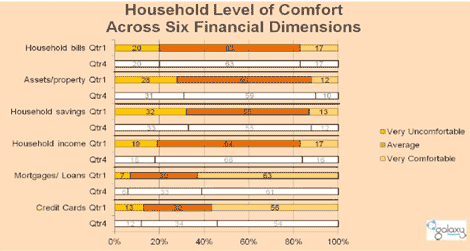Victorian borrowers most comfortable with level of mortgage debt: ING Household Financial Wellbeing Index
Victorian borrowers feel more comfortable about their level of long-term debt than borrowers in the other states and territories, according the ING Household Financial Wellbeing Index.
Victorian borrowers scored 5.8 out of seven in this category, up from 5.5 a year ago.
A score of one indicates “very uncomfortable” and a seven indicates “very comfortable”.
Victoria scored above the national average of 5.5 and higher than NSW/ACT (5.6 up from 5.4 a year ago), Queensland (5.6 up from 5.4) and WA (5.6 up from 5.4).
South Australians feel least comfortable about their level of mortgage debt, with a comfort rating of 5.4. It is the only state to record a decline in mortgage comfort, down from 5.5 a year ago.
Victoria has the lowest percentage of borrowers (34%) paying extra on their mortgages, with the highest proportion found in WA and Queensland (46% paying extra on their mortgages).
Overall borrowers are more comfortable with their level of mortgage debt than they were a year ago, with the national index rising from 5.4 to 5.6.
The survey, which is based on the responses of 1,015 households between March 27 and April 2, 2012, found that the vast majority (93%) of households are comfortable with their home loan, with 63% “very comfortable” – the highest level recorded since the third quarter of 2010.
Click to enlarge
Four out of 10 (40%) mortgage holders are paying off their loan ahead of schedule, according to the survey.
The survey found that nearly a third (31%) of households have share market investments (up from 24% in the fourth quarter), while more than half (51%) of households have no assets or investments outside of the family home.
The median value of total assets in each household (including equity in the family home) is $306,993.
One in five (21%) households say that they don’t have any investments or assets at all.
Long-term assets remains a weak spot of financial wellbeing, with 28% of households saying they are “very uncomfortable” with their level of investments and long-term assets, down from 31% in the fourth quarter of last year.
Nationally however there has been a slight increase in the numbers of households owning long-term investments – 17% own a rental property, up from 15% three months ago, and 31% hold sharemarket investments, up from 24%.
The overall Household Financial Wellbeing Index reached 106.9 in the first quarter of 2012 up from 105.6 in the fourth quarter of 2011.
Although this is below the reading of 107.5 achieved on inception of the index in the first quarter of 2010, it confirms an ongoing uptrend in financial wellbeing since the index plunged in the first quarter of 2011.
